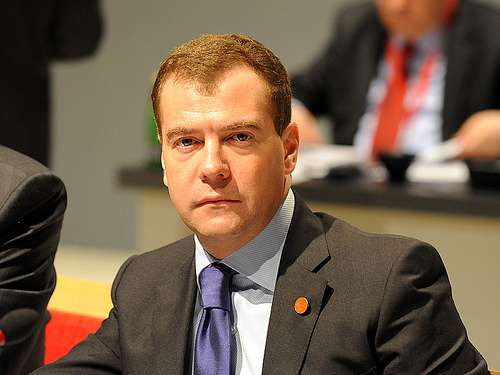Medvedev Quotes Lenin While Speaking Against the Cyprus Bailout Deal

The Russian prime minister is not happy about the Cyprus bailout deal. At a meeting with deputies Dmitry Medvedev invoked a phrase of Lenin's in reference to the new agreement. From The Telegraph:
Meeting deputies at his residence outside the city, Russia's Prime Minister said there was a need to "understand what this story turns into in the long run, what the consequences for the international financial and monetary system will be - and thus, for our own interests as well."
Mr Medvedev prefaced his comments by addressing Deputy Prime Minister, Igor Shuvalov, with the words: "Let us, Igor Ivanovich, talk about what's happening with Cyprus. The stealing of the stolen is continuing there, I think."
The seemingly clumsy phrase was in fact a sharp reference to a quote attributable to Vladimir Lenin, who used it to justify the confiscation of capitalists' property.
Russians with large deposits in Cypriot banks will be especially hard hit by the recent Cyprus bailout deal. The deal guarantees deposits of under 100,000 euros. However, deposits worth more than 100,000 euros will be affected, with perhaps as much as 30 percent of the deposits being taken to pay for the bailout. The new deal includes a restructuring of Cyprus' banking sector, with the country's second largest bank having deposits below 100,000 euros being moved to the Bank of Cyprus and deposits of over 100,000 euros being moved into a "bad bank."
Under the original deal all accounts in Cypriot banks would have been affected. However, the Cypriot government rejected that deal.
Russians have about 20 billion euros in Cypriot banks, a substantial amount of which will be used by the Cypriot government to raise the amount necessary to secure a 10 billion euro bailout.
Medvedev has touched upon Russian history before while discussing the Cyprus crisis, having earlier said that the E.U. was behaving like the Soviet Union. Unfortunately for Russian citizens with more than 100,000 euros in Cypriot banks it looks like they will be unwillingly contributing to the latest chapter of the euro crisis.


Show Comments (129)